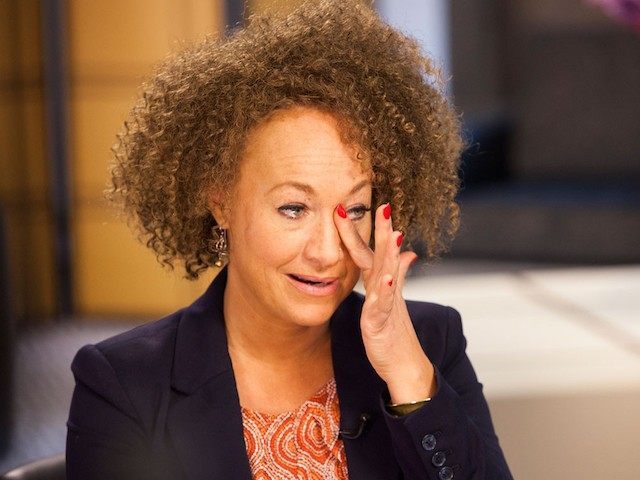Two years after being exposed as a white woman posing as a black civil rights champion, former NAACP branch president Rachel Dolezal is jobless, welfare dependent, and a month away from being homeless.
“There’s no protected class for me,” Dolezal told the Guardian. “I’m this generic, ambiguous scapegoat for white people to call me a race traitor and take out their hostility on. And I’m a target for anger and pain about white people from the black community. It’s like I am the worst of all these worlds.”
In 2015, Dolezal was an African-American culture instructor at Eastern Washington University, head of the Spokane, Washington NAACP, and chair of Spokane’s civilian police oversight committee. A year later, her years-long lie had unraveled, and she was outed as a white woman living in blackface.
Dolezal says after turning in dozens of employment applications, the only job offers she’s received are from porn and reality TV agents. Having relied on a friend to help pay her February rent, Dolezal is days away from being out on the street.
In June 2015, Lawrence Dolezal, Rachel’s white birth father, told CNN he didn’t “understand why she feels it’s necessary to misrepresent her ethnicity.”
According to Rachel, there was no misrepresentation because she believes she’s been black all along.
“I do think a more complex label would be helpful, but we don’t really have that vocabulary,” Dolezal told the Guardian. “I feel like the idea of being trans-black would be much more accurate than ‘I’m white.’ Because you know, I’m not white.”
“It wasn’t like the honest thing to do is say, ‘I’m white’, because race is a social construct,” Dolezal explained “And this gave me this great sense of internal freedom: I wasn’t actually all fucked up. I was actually on to something this whole time.”
Dolezal’s Montana birth certificate states she was born to two Caucasian parents, according to documents shared with CNN. Rachel attended college in Mississippi, where she says she “got more involved with campus activism” and her “appearance became more Afrocentric.”
“I started wearing my hair in box braids and sporting dashikis and African-patterned dresses,” Dolezal told the Guardian. “I thought these clothes were beautiful, and in the Mississippi heat, the fabric did a good job of keeping you cool.”
“On the white side I noticed hatred, fear and ignorance,” Dolezal recounted. “And on the black side I noticed fear, anger and pain. I felt more at home with the anger and pain towards whites, because I had some anger and pain – toward not just my parents but also, even though I wouldn’t have been able to articulate it then, towards white supremacy.”
Tanning her skin, wearing weave, dressing in African garb, and other external vestiges of blackness, Dolezal said, helped her renounce “the propaganda standards of European beauty being superior.”
Dolezal later attended Howard University on a scholarship. She didn’t identify herself as black on her school admissions application because there was no such option at the historically black university. But most assumed she was black, Dolezal’s mother Ruthann Dolezal told CNN, “because her portfolio of art was all African-American portraiture.”
According to Dolezal’s parents, 2007 is when their daughter began to identify and consider herself African-American. In 2010, Rachel sought emancipation from Ruthanne and Lawrence Dolezal.
Ezra Dolezal, Rachel’s adopted brother, says he knew the fabricated lie his adopted sister had created for herself would begin to crumble.
“I kind of saw it coming,” Ezra Dolezal told CNN. “Instead of sticking to a simple story, she’s been trying to make this really complex and it finally got too big for her to handle.”
Now, unapologetic, Rachel Dolezal is defiant and doesn’t regret her decision to identify as a black woman.
“I’m not going to stoop and apologize and grovel and feel bad about it,” she said. “I would just be going back to when I was little, and had to be what everybody else told me I should be – to make them happy.”
Rachel Dolezal’s story became a national phenomenon.
Within a week of many prominent liberals and President Obama praising Bruce Jenner’s courageous decision to transition from a man to a woman, many of those same liberals failed to extol or explain how it wasn’t also brave for a white woman in Dolezal to pretend to be black.
Follow Jerome Hudson on Twitter @jeromeehudson

COMMENTS
Please let us know if you're having issues with commenting.